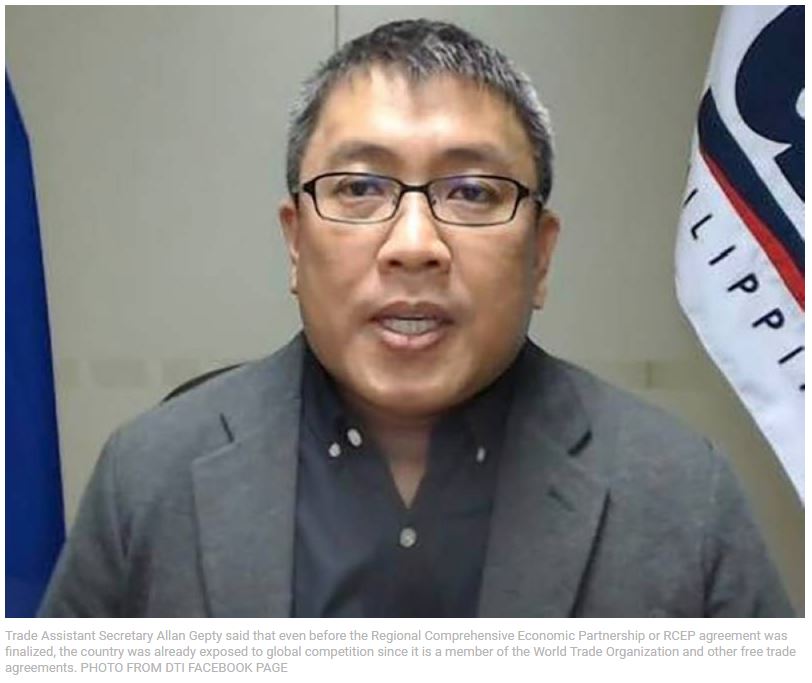RCEP and its impact on Philippines
ON Nov. 15, 2020, Association of Southeast Asian Nations (Asean) member states and its dialogue partners signed the Regional Comprehensive Economic Partnership (RCEP) agreement that is considered as the largest free trade deal in the world.
The agreement is an economic treaty brokered by the Asean, of which the Philippines is a member, and its dialogue partners — Australia, China, Japan, New Zealand and South Korea.
The mega free trade deal has specific provisions covering trade in goods, including rules of origin; customs procedures and trade facilitation; sanitary and phytosanitary measures; standards, technical regulations and conformity assessment procedures; and trade remedies.
It also covers trade in services including specific provisions on financial services; telecommunication services; and professional services, as well as the temporary movement of natural persons. In addition, there are chapters on investment; intellectual property; electronic commerce; competition; small and medium enterprises (SMEs); economic and technical cooperation; government procurement; and legal and institutional areas including dispute settlement.
In terms of market access, the agreement achieves liberalization in trade in goods and services and has extended coverage to investment.
RCEP covers 2.3 billion people or about 30 percent of the world’s population and is expected to contribute $25.8 trillion or about 30 percent of global gross domestic product (GDP).
It also represents 50 percent of the global manufacturing output; 50 percent of global automotive output; 70 percent of electronics output; 26 percent of global value chain (GVC) trade volume; 60 percent GVC for electrical/machinery, petroleum/chemicals, textile/apparel, metal and transport equipment; 35 percent contribution to global exports of electronics and machineries; and the main GVC hubs of big economies such as South Korea, Japan and China.
The agreement entered into force on Jan. 1, 2022 for 10 signatory states, namely Brunei Darussalam, Cambodia, Lao People’s Democratic Republic, Singapore, Thailand, Vietnam, Australia, China, Japan and New Zealand.
The deal took effect in Korea earlier this month and will come into force in Malaysia next month.
Gains seen from RCEP
For the Philippines, a study released by Philippine Institute of Development Studies (PIDS) research fellow Dr. Francis Quimba showed that RCEP is expected to add approximately 2 percent in real GDP growth.
A separate study conducted by Dr. Caesar Cororaton showed RCEP is estimated to improve the country’s trade balance by as much as $128.2 million, increase overall welfare by $541.2 million and lower poverty incidence by 3.62 percent in 2030.
While the agreement seems to provide several opportunities and received the backing of business organizations and industry groups, several lawmakers and farmer groups expressed concern about the country’s participation.
The Federation of Free Farmers for instance warned that major economic sectors, particularly agriculture, are not yet ready in terms of competing in the international market.
Trade Assistant Secretary Allan Gepty, however, explained that competition is already present since the Philippines is a member of the World Trade Organization (WTO) and other free trade agreements.
“In other words, in terms of competition, the same is not totally new. If there is something new in RCEP, it is more coverage of the free trade area and the rules and disciplines,” Gepty said.
Gepty said RCEP has mechanisms providing for adjustments to commitments within the agreement, noting that the agreement tries to accommodate the circumstances of RCEP parties, which are at differing levels of development.
“There may be cases wherein commitments made in the RCEP Agreement need to be adjusted or addressed due to exceptional circumstances that affect our economy and industries as well as our farmers. The RCEP negotiators acknowledged this possibility and therefore incorporated various mechanisms in the FTA (free trade agreement) that act as safety nets so that RCEP countries are able to address these circumstances. These are on top of the available measures to the Philippines under the WTO agreements,” he said.
While the agreement was ratified by President Rodrigo Duterte in September 2021, the Senate closed its session earlier this month without the needed ratification.
This means that the ratification and the country’s participation in the agreement will be left at the hands of the next administration.
Economists believe that the Philippines’ participation in the agreement should be part of the administration’s priority measures in the long run.
Moody’s Analytics associate economist Sonia Zhu pointed out that while things will most likely be at status quo because the implementation of the trade clauses under RCEP takes time, failure to ratify may affect investors’ sentiment.
“In the long term, the failure to ratify RCEP may impact the attractiveness of the Philippines to foreign investors; long-term investments may curtail despite the recent changes to the foreign investment act,” Zhu said.
A Rizal Commercial Banking Corp. (RCBC) chief economist also warned that delay in the membership of the country into the RCEP would result in foregone opportunities, such as the potential increase in exports and imports, which are badly needed for the economic recovery program.
Michael Ricafort said another foregone opportunity is the potential increase in foreign direct investments, especially those from multinational companies that are attracted to locate in a RCEP member country to access the bigger export markets of other member countries.
“Thus, membership in the RCEP would be part of the country’s priority measures to support faster economic recovery prospects for the country, complementing other reform measures such the Create Law, Retail Trade Liberalization Act, Public Services Act, Foreign Investment Act, all of which aim to attract more international investments into the country, create more employment and other economic opportunities in the country,” he said.
Source: https://www.manilatimes.net/2022/02/17/business/top-business/rcep-and-its-impact-on-ph/1833186


 Thailand
Thailand




